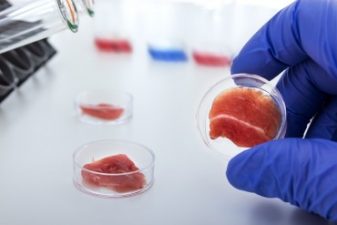 Green Prophet’s told you about fish reared on pork products and Jordanian cows banned because of lumpy skin, but this story about beef burgers cooked up in a petrie dish really takes the cake! The world’s first laboratory-grown hamburger was just served up in London.
Green Prophet’s told you about fish reared on pork products and Jordanian cows banned because of lumpy skin, but this story about beef burgers cooked up in a petrie dish really takes the cake! The world’s first laboratory-grown hamburger was just served up in London.
The burger was unveiled by its creator Mark Post, Vascular Physiology Head of the Department of Physiology at Maastricht University. The fake meat, which cost about $325,000 to produce, was then taste-tested at a London press conference.
Austrian food researcher Hanni Ruetzler told the BBC, “I was expecting the texture to be softer. There is some intense taste. The consistency is perfect, but I miss salt and pepper.”
The protein patty was formed from 3,000 microscopic strips of artificial meat grown from cow stem cells. The team of scientists who concocted it believe that the product could become a household staple within a decade (or two). It’s part of food revolution taking place in laboratories (instead of kitchens) as scientists explore ways to offset the extreme environmental damage caused by livestock and seek to adequately feed the world’s hungry.
“Eventually, my vision is that you have a limited herd of donor animals which you keep in stock in the world,” Post told The Independent, “You basically kill animals and take all the stem cells from them, so you still need animals for this technology.”
“Right now, we are using 70% of all our agricultural capacity to grow meat through livestock. You are going to need alternatives. If we don’t do anything, meat will become a luxury food and will become very expensive,” said Post.
Compared to traditionally reared beef, test tube burgers would result in 45% less energy use, 96% fewer greenhouse gas emissions and 99% less land use, according to an independent study published in Environmental Science and Technology. It would also allow “meat” production to occur virtually everywhere, including in water-starved regions like the Middle East.
Google Co-Founder Sergey Brin financed the project, underwriting Big Science with potential for super scalability. The idea is to ultimately lower productive costs to be competitive with traditional ranching, then undercut the multi-billion-dollar meat industry as it gains a larger market share.
It’s a solid source of protein that looks like meat, smells like meat, and kinda sorta tastes like meat. No question it’s an environmental game-changer. But how about a poll in the comments section: would you eat this stuff?
Image of woman with a burger from Shutterstock



